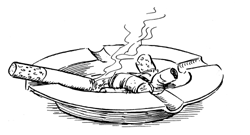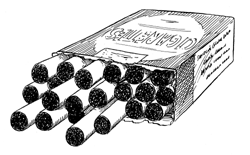The American Lung Association has compiled a
comprehensive guide to state tobacco control laws, titled State Legislated Actions on Tobacco Issues.*
The following is an excerpt of some of those laws.
State Legislated Actions on Tobacco Issues
|
Restrictions on Smoking in Public Places
|
 |
Forty-nine states and the District of Columbia have clean indoor air provisions restricting smoking in certain places. These laws range from simple limited restrictions, such as designated areas in schools, to laws that limit or ban smoking in virtually all public places, including elevators, public buildings, restaurants, health facilities, public conveyances, museums, shopping malls, retail stores, and educational facilities (Vermont). California requires enclosed separately ventilated smoking areas in private workplaces including bars and restaurants, or smoking must be banned entirely. Fourty-four states and the District of Columbia restrict smoking in government workplaces and twenty-two states and the District of Columbia restrict smoking in private sector working places.
|
Tobacco Excise Taxes
|
Cigarettes
|
All 50 states and the District of Columbia impose an excise tax on cigarettes.
|
Youth Access
|
Age Restrictions on Sales of Tobacco Products
|
All 50 states and the District of Columbia prohibit the sale of tobacco products to minors. Most states define minors as persons under 18 years of age, however, enforcement varies widely.
|
Penalties to Minors
|
Forty-four states penalize minors for tobacco-related offenses.
|
Restrictions on Distribution of Tobacco Product Samples or Sales of Single Cigarettes
|
Tobacco Product Samples
|
Forty-five states and the District of Columbia restrict the distribution of free samples of tobacco products.
|
Sales of Single Cigarettes
|
Thirty-three states restrict the sale of cigarettes outside of their original package.
|
Restriction on Sales of Tobacco Products in Vending Machines
|
Forty-three states and the District of Columbia restrict the placement of tobacco product vending machines. Fifteen states allow vending machines in any location with a locking device or within the direct line of sight of clerks.
|
Smoker Protection Laws
|
|
Twenty-nine states and the District of Columbia passed some form of smoker protection legislation between 1989 and 1996.
|
Tobacco Product Disclosure
|
|
Five states require tobacco product disclosure information.
|
Tobacco Divestment
|
|
Massachusetts passed the first state law to prohibit new public pension funds from investing in stocks, securities, or other obligations of any companies that derive more than 15 percent of their revenue from the sale of tobacco products and requires divestment of existing investments.
|
Tobacco Liability
|
Industry Protection
|
Five states passed legislation that effectively caps the appeal bond for the punitive damages portion of a judgment in a civil action. Florida and Kentucky have set the limit for supersedes bonds at $100 million, while Georgia, North Carolina, and Virginia have imposed a limit at $25 million.
|
Tobacco Settlement Funds
|
Forty-one states have made decisions with provide for the allocation of settlement dollars to tobacco prevention programs. The amounts rage from $18.8 million for prevention programs in Maine, to $500,000 in Kansas. Eight states have allocated settlement amounts close to or above the Centers for Disease Control minimum recommendations for statewide tobacco prevention programs.
|

